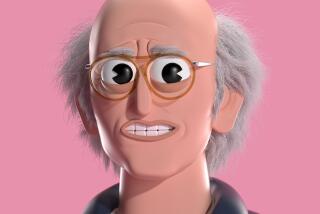Kuralt: Still a Roads Scholar
- Share via
Time does get away from you. Charles Kuralt has been on the road for CBS, rediscovering an America that doesn’t make the headlines, for more than 20 years.
He did an anthology of his “On the Road” pieces a year ago, to celebrate the anniversary. He returns tonight with another compilation, “Back on the Road With Charles Kuralt” (10 p.m., Channels 2 and 8), which needs to celebrate nothing more than the happy fact that he is still at it.
In the big van that he and his cameraman and soundman take turns driving, Kuralt continues to explore the shunpikes, the “Blue Highways” celebrated by William Least Heat Moon in his remarkable book (which Kuralt regards as a masterpiece).
The other America that Kuralt seeks seems remarkable for its stability and continuity, its strong sense of community and of the past and the evidence it offers of a quirky, inventive independence and originality.
The present selection of “On the Road” reports includes a piece on funny mailboxes and a stop at a drug store where each of several dozen regulars has his own cup. Kuralt looks in on a high school shop class that went beyond birdhouses and built a stylish airplane that flew (as we see) and was sold for a profit. It is part of a segment on people who make things, from bricks to a private highway.
He introduces us to a crusty old Georgian who painted a thicket of road signs at his rural crossroads because he was tired of giving directions.
A Vermont town meeting during a winter snowstorm draws some patriotic rhetoric a little heavier than Kuralt’s usual low-key style (which can be called eloquently conversational). Another town harvests winter ice for a mid-summer ice cream social.
Kuralt was on detached duty to cover the Gorbachev-Reagan summit in Moscow when an elderly Russian powered his way past the concessionaires in the hotel and demanded to talk to an American journalist.
“It’s almost impossible for a Russian to get into a tourist hotel,” Kuralt said at breakfast in Los Angeles a few days ago. “But this man had a chestful of World War II medals and they get great respect in Russia.”
Kuralt arranged to meet the man in a park.
“He’d been a German prisoner of war in a camp with 8,000 Americans. The Russians were dying of malnutrition; the Americans were getting Red Cross food parcels every week.” The Russian, who was an army dentist, and an American doctor and a few other GIs concocted a plan by which the Americans tossed food parcels over a barbed-wire fence to the Russians under the cover of darkness.
The dentist had written the names down and waited more than 40 years for a chance to say thanks. Kuralt did a piece from Moscow; from New York the “CBS Evening News” did another when it located some of the Americans and a third when one of the Americans went to Moscow for a tearful reunion with the dentist.
On the show it makes a mini-documentary that is unlikely to leave a dry eye in the living room.
Kuralt, just back from a three-week vacation, has resumed the old pattern.
“I fly out from New York on Monday to wherever the van is.” Most recently it was in Denver. “We drive and shoot during the week, and Friday night I fly back to New York to do the Sunday show (‘Sunday Morning’).”
Kuralt, originally a newspaperman in his native North Carolina, had been hired by CBS in 1957 as one of a number of young writers regarded as hot prospects (Harry Reasoner and Marvin Kalb were in the group). He did three years as Rio de Janeiro correspondent and was the CBS bureau manager in Los Angeles from 1962 to 1965.
“We were in the basement over at Television City and we had to rent land lines to feed the ‘Evening News.’ It was expensive and we didn’t feed much. But I covered the kidnaping of Frank Sinatra Jr., the earthquake in Anchorage, the collapse of the Baldwin Hills dam, that kind of thing.”
Back in New York, he proposed the “On the Road” idea. Fred Friendly turned it down but Richard Salant, who came in as news director, encouraged him to give it a try. Kuralt and a crew drove north from New York with only one vague story in mind. (It didn’t work.) The first to air was on New England’s fall foliage.
“I thought it might offer a leavening to all the awful things that were going on in the country in the late ‘60s. Even Walter Cronkite, who wasn’t hot for features, liked the reminders that the whole country wasn’t in flames.”
At first, Kuralt says, he thought they’d find their stories in the local papers. “But we found ourselves doing stories the papers hadn’t done because everybody in town already knew about them.”
By now, of course, many stories arrive in the mail. But Kuralt says, “We still stumble into a lot of them just by staying off the interstates.” He also stays away from stories in the news because they are so perishable.
“We’re careful not to come into town like a big-time TV crew. We never want to be intimidating and I don’t think we are.”
The stories are edited in New York, but Kuralt supplies very specific editing instructions, easier now that tape has replaced film. He tries to keep a low profile himself.
“In many of the stories I’m not seen at all. The cameraman and I were once watching a local television news show and there was a feature on a tricycle race. I said, ‘You watch, the reporter is going to ride one of those tricycles.’ Sure enough, he did.”
His colleagues, Kuralt says, “kid me about missing out on all the important things in life. For Roger Mudd, covering Congress is a life-absorbing job. But I’d rather do the small things. I did a column called ‘People’ when I worked in Charlotte. Kids, cops, dogs, that kind of thing. I learned there that that was what I wanted to do.
“I get to choose all my own stories. It’s still the best job in television.”
More to Read
Sign up for The Wild
We’ll help you find the best places to hike, bike and run, as well as the perfect silent spots for meditation and yoga.
You may occasionally receive promotional content from the Los Angeles Times.






